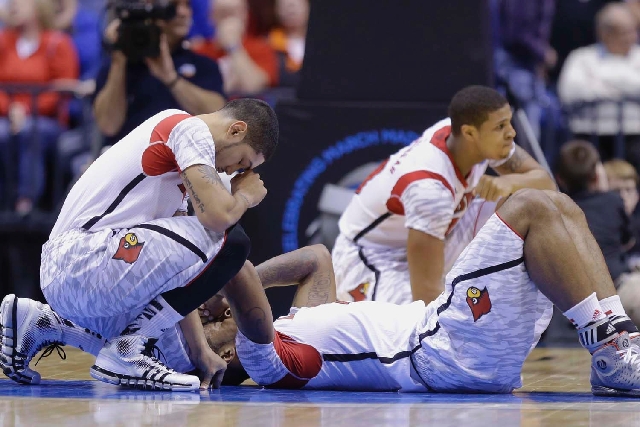Steely women would’ve rushed to comfort injured teammate

In the movie “Steel Magnolias,” which is based on a true story, Sally Field’s character M’lynn recalls the moment doctors pulled the plug on her comatose daughter Shelby. She stayed in the room as her daughter left the world, M’lynn tells her friends, but Shelby’s father couldn’t do it, nor could her husband. Too hard to watch.
“I find it amusing,” she says. “Men are supposed to be made out of steel or something.”
I was reminded of that classic movie scene while watching what will undoubtedly become a classic sports scene. Had it been a women’s basketball team watching its teammate wail in pain on the sidelines, I suspect the reaction to the already-infamous Louisville injury would’ve played out much differently.
On Sunday, after springing in the air to contest a Duke 3-pointer, Louisville’s Kevin Ware landed tragically wrong. He sustained the kind of injury that’s more likely to happen to athletes wearing helmets.
His teammates saw his bone had broken skin, and immediately turned away. A few fell to the floor. Players on the Louisville bench covered their faces with towels and leaned their bodies in the opposite direction of the mangled leg.
They were shaken, clearly, by their teammate’s horrific injury. But, with one exception, the only people who rushed to Ware’s side were those paid to do it.
Let’s imagine for a moment that Kevin was Kate and her teammates wore sports bras.
The first instinct for most female athletes would have been to help, no matter how unsettling the dangling ankle. Coaches likely would have had to ask players to back up to give their teammate room.
That’s what happened in 2009, when American female sprinter Muna Lee fell during a relay at the world track and field championships in Berlin. Her teammates crouched next to her as trainers saw to the source of her screams. Lee’s teammates even followed the gurney that rolled her away, despite officials’ aggressive efforts to stop them.
I realize an injured teammate with no bones waving “hello” is different than Ware’s injury. But, the real difference should only come down to reaction time. Shock will, undoubtedly, delay the process.
According to the National Center for Catastrophic Sport Injury Research, cheerleading is the most dangerous women’s sport. In terms of the most serious injuries, in men’s or women’s sports, it’s second only to football.
I can’t imagine a squad of girls whose sport revolves around heightening spirits not rushing to their fallen teammate, no matter how gruesome her injury. I can’t imagine them wanting to do anything but hold her hand and offer words of encouragement.
Whether on the court of life or sport, women tend to suck it up in the midst of tragedy and come to the aid of those who need them.
For any male readers feeling offended right about now, rolling up sleeves to fire off an angry email, do us both a favor. Don’t send the email and don’t feel offended.
This isn’t criticism. This is observation. Don’t think of it as an umpire calling you out. Think of it as an announcer calling it how she sees it.
I don’t take issue with the way Louisville reacted to Ware’s injury. I, for one, was deeply touched by it. The tears, the anguish, the bodies collapsing at the sight of their teammate’s tragic injury. That was a beautiful display of camaraderie.
There’s no right or wrong way to react to a teammate’s broken bone hatching from his leg on a basketball court. But there is a man’s way and there is a woman’s way. At the end of the game, it’s about what works best for the team.
Considering Louisville followed Ware’s last wishes to them and beat Duke, 85-63, it looks like they handled things just fine.
I’d be remiss if I didn’t note the one teammate who left the bench and kneeled next to Ware as trainers tended to him. I know nothing about No. 11, Luke Hancock, but as he laid his hand on Ware’s chest and spoke to him, I was pretty sure we were looking at the most sensitive dude on the team.
When Hancock stood up and inched his way to Ware, he proved some men really are made of steel. Some men are as strong as women.
Contact Xazmin Garza at xgarza@reviewjournal.com or 702-383-0477. Follow her on Twitter @startswithanx.